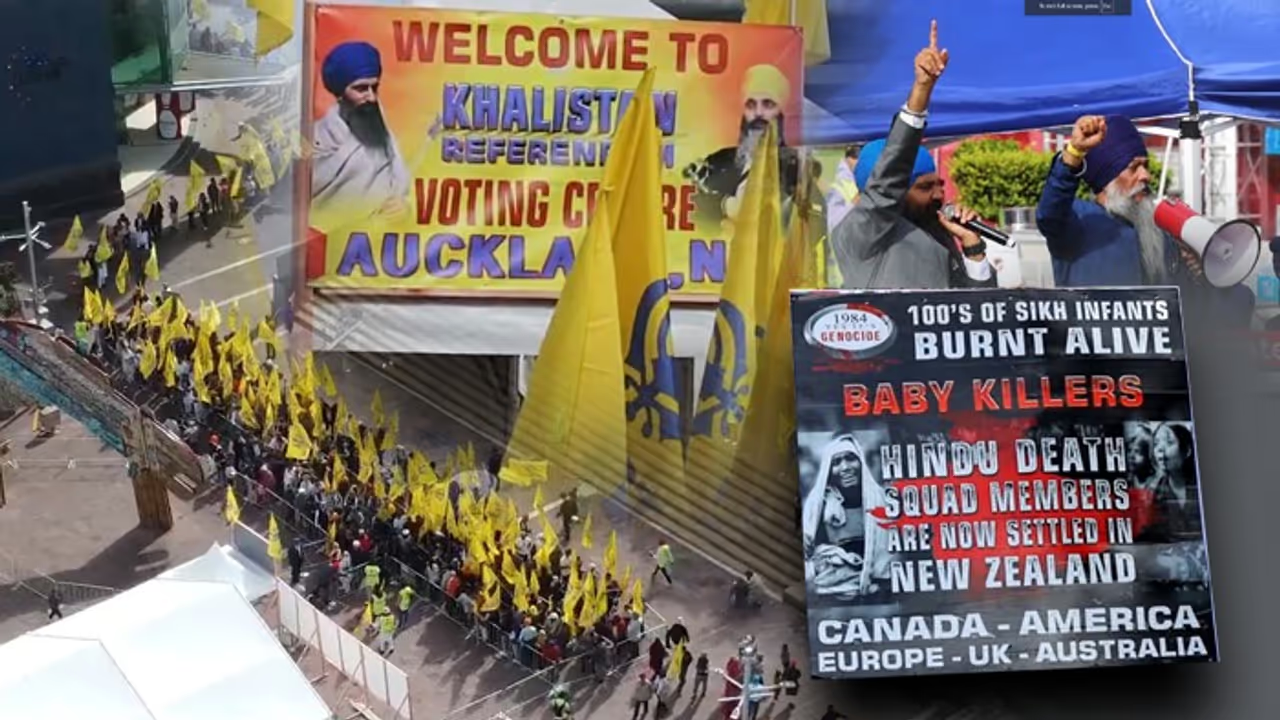A controversial "referendum" promoting the creation of an independent Sikh homeland, Khalistan, took place in Auckland's Aotea Square, New Zealand, on Sunday, drawing international attention and sparking outrage.
A controversial "referendum" promoting the creation of an independent Sikh homeland, Khalistan, took place in Auckland's Aotea Square, New Zealand, on Sunday, drawing international attention and sparking outrage. The event, organized by the Sikhs for Justice (SFJ) group, is part of a broader campaign that has previously seen similar "referendums" held in Canada, the UK, and Australia. This gathering marks the latest chapter in a contentious push for a separate Sikh state within India, a movement that has garnered vehement opposition among several Indians.

Sikhs for Justice has been banned in India since 2019 and is considered a terrorist organization by the Indian government. Its association with figures linked to terrorist activities, including Talwinder Singh Parmar—widely recognized as a key conspirator in the 1985 Air India bombings—has drawn sharp criticism. During their earlier "referendums" in Calgary and elsewhere, SFJ has honoured individuals involved in terrorist acts, fueling concerns about the group's true intentions.
The event in Auckland has stirred significant backlash within New Zealand's Indian community, which makes up a substantial portion of the population. Local organizations have strongly condemned the event, with leaders like Narendra Bhana, president of the New Zealand Indian Central Association, emphasizing the need for vigilance against "foreign influences" attempting to destabilize the nation's peace and unity.
"The Indian community in New Zealand stands united in its resolve to reject external influences that do not align with the values of community and respect, which are central to the diverse cultures coexisting in this country," Bhana had said earlier this month.
The situation has also raised concerns in diplomatic circles. New Zealand's Foreign Minister Winston Peters recently discussed the issue with India's External Affairs Minister, S. Jaishankar, during a meeting in Canberra. India's government has repeatedly condemned the Khalistan movement, warning that such actions threaten bilateral relations. Experts fear that if unrest were to break out, it could damage New Zealand's ties with India, a key economic partner.
Last week, police in Auckland confirmed they were aware of the planned referendum and were prepared to ensure public safety.
"New Zealand Police recognises the right to protest and is working with the organisers, alongside other relevant authorities, as well as the community," a Police spokesperson had said.
"Police is aware of tensions around the referendum and will have a presence at any events. Police is fully briefed and prepared to keep everyone safe."
However, tensions remain high, with fears that the event could escalate into violence.
The Sikh community in New Zealand, which comprises around 1% of the population, has been caught in the crossfire of this political and ideological battle. While some support the Khalistan cause, many others, including Sikh organizations in New Zealand, have distanced themselves from the movement, emphasizing unity and shared values over political divisions.
Narinder Singh Warraich, a trustee of the United Voice Community Trust, called for solidarity in the face of external political pressures.
"By focusing on unity and setting aside political issues, we honour the long-standing relationship the Asian community has built in New Zealand over the past century. This approach reinforces that the community's solidarity and shared values are more significant than any external political disagreements," he was quoted as saying in a RNZ report last week.
Sunday's Khalistan 'referendum' in Auckland comes amidst heightened diplomatic tensions between India and Canada.
Relations between India and Canada have been severely strained since September of last year, when Prime Minister Justin Trudeau publicly alleged the “potential” involvement of Indian agents in the killing of Khalistan extremist Hardeep Singh Nijjar. India swiftly rejected these claims, labeling them as “absurd.”
Nijjar, who was designated a terrorist by NIA in 2020, was shot and killed outside a Gurudwara in Surrey in June 2023. New Delhi maintains that the core issue in the ongoing tensions is Canada's failure to curb the activities of pro-Khalistan groups operating freely on Canadian soil.
In response to Canada's accusations, India expelled six Canadian diplomats, withdrew its high commissioner Sanjay Verma, and recalled other “targeted” officials, strongly rejecting Ottawa's charges.
Earlier this month, A widely circulated video showed a violent group attacking Hindu devotees outside a Brampton temple with sticks, while also displaying flags linked to pro-Khalistani groups. The incident further fueled tensions between Khalistanis and the Hindu community in Canada.
